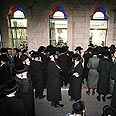
Haredi community - shortage of schools
צילום: גיל יוחנן
Died of a broken heart
Jacob (Jacko) Sofer from Jerusalem felt a pain in his heart, passed out and died. Friends from the Haredi-Sephardic community are sure it was the result of his heartbreak at not being able to get his daughter into the school of her choice
So much heartbreak regarding children's education: Thursday evening, Jacob (Jacko) Sofer left his Jerusalem home in a cab. A few minutes later, he felt a pain in his heart, lost consciousness and, despite efforts to resuscitate him, died.
Thus far, it sounds like another sad but familiar story of a forty-something man passing away before his time. However, the Haredi-Sephardic community in Jerusalem is convinced that the reason for his early death is a problem that plagues hundreds of the community's families.
"He ate his heart out that he couldn't get his daughter into the seminary of her choice," said one of Sofer's close friends. "In recent weeks, he was informed that his daughter could not study in the seminary that she desires. He kept saying that he couldn't handle it, that it would kill him – that's exactly how he expressed himself – that he couldn't bear his daughter receiving Torah instruction like the average girl."
Work colleagues said that, on the afternoon of his death, he spoke to them about the issue and appealed for their help: "I have no energy. You have to help ensure that my daughter gets into a good seminary."
A grave injustice
Even eulogies at Sofer's funeral, which took place at one a.m. Friday morning, touched upon the issue. "He died dedicated to the education of his children," said one mourner. "Everyone is speaking of the injustice that was done to him," he added.
Sofer, who leaves behind a wife and five daughters, worked for the Yad-Eliezer charity organization, which distributes food to needy families and sponsors a mentoring program for troubled youth. "He was a person who was ready to do everything for everyone," said his friends. "He worked for that organization ten times what they paid him, worked day and night and you never heard him complain. He had a heart of gold."
Discrimination against Sephardic girls in the Haredi school system is perhaps one of the more painful issues among the Haredi community. The Ashkenazi schools for girls are considered better, particularly in recent years, and demand far outpaces supply. As a result, these schools tend to enroll students from Ashkenazi homes and, only later, Sephardic students.
Based on predetermined agreements, Ashkenazi schools must afford at least 30 percent of their enrollment slots to Sephardic students. In many cases, despite intervention of rabbis, principals refuse to take any more than the requisite number.
400 girls have nowhere to study
A city councilman of the Shas party, Shmuel Yitzhaki, explained the source of the problem to Ynet: "Sadly, most of the good schools belong to our Ashkenazi brothers, who have been on the map for close to 50 years, and thus, the Sephardic community lags behind them in this area. This year, there are some 400 girls who need to begin seminary, but there is not room for them to study.
"We're in a situation where we have to beg to get our girls enrolled in educational institutions. Not just beg, but yell and cry. In many cases, girls prefer not to study anywhere else, in hopes that they will be accepted to the school of their choice."
Lawyer Ari Eitan, as part of his work, help parents in their struggle against schools that do not agree to accept their children. "In conversations I've had with the Ministry of Education, sources claim that the Haredi schools said that they didn't discriminate. For some reason, the ministry chose to take their word, despite the fact that any Haredi child in the street knows that there is flagrant discrimination," he said.
In Eitan's opinion, the reason Sephardic students are not accepted to the schools is a result of explicit racism. "Principals say clearly: 'we've filled the Sephardic quota'. This is open racism, they're not even trying to hide it, and it's one of the greatest injustices in the Haredi community," he says.










